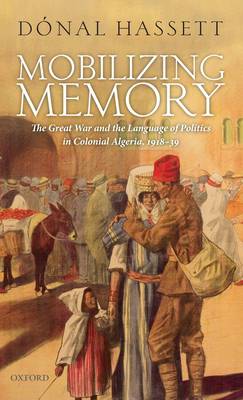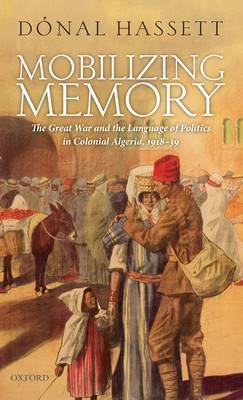
Je cadeautjes zeker op tijd in huis hebben voor de feestdagen? Kom langs in onze winkels en vind het perfecte geschenk!
- Afhalen na 1 uur in een winkel met voorraad
- Gratis thuislevering in België vanaf € 30
- Ruim aanbod met 7 miljoen producten
Je cadeautjes zeker op tijd in huis hebben voor de feestdagen? Kom langs in onze winkels en vind het perfecte geschenk!
- Afhalen na 1 uur in een winkel met voorraad
- Gratis thuislevering in België vanaf € 30
- Ruim aanbod met 7 miljoen producten
Zoeken
Mobilizing Memory
The Great War and the Language of Politics in Colonial Algeria, 1918-1939
Donal Hassett
Hardcover | Engels
€ 138,45
+ 276 punten
Omschrijving
Over the course of the Great War, a quarter of million settlers and subjects from Algeria served in French forces. Thousands more crossed the Mediterranean to work in the war industries of metropolitan France. On the Algerian Home Front, men, women, and children of all ethnic, religious, social, and political backgrounds contributed to the imperial war effort. Mobilising Memory is the first study to explore how the mass mobilisation of Algerian society during the First World War transformed politics in the colony. It asks how actors across the colony's racial, ideological, and class divides sought to legitimise their competing visions for Algeria's future by evoking their wartime service. Without diminishing the coercive power of the colonial state, it stresses the agency of the citizens and subjects of Algeria who sought to leverage their contribution to the war to enhance their positions within colonial society. In doing so, Mobilising Memory explores the consequences, often unintended, of framing political, social, and economic demands in a language rooted in the experience of the Great War. It argues that the predominance of this shared political language - grounded in notions of loyalty to and sacrifice for France - meant that most actors in interwar Algeria sought not to break with the Empire but rather to renegotiate their place within it. While these efforts rarely proved successful, the volume demonstrates how they radically reshaped the practice of politics in the colony.
Specificaties
Betrokkenen
- Auteur(s):
- Uitgeverij:
Inhoud
- Aantal bladzijden:
- 254
- Taal:
- Engels
Eigenschappen
- Productcode (EAN):
- 9780198831686
- Verschijningsdatum:
- 8/10/2019
- Uitvoering:
- Hardcover
- Formaat:
- Genaaid
- Afmetingen:
- 142 mm x 218 mm
- Gewicht:
- 453 g

Alleen bij Standaard Boekhandel
+ 276 punten op je klantenkaart van Standaard Boekhandel
Beoordelingen
We publiceren alleen reviews die voldoen aan de voorwaarden voor reviews. Bekijk onze voorwaarden voor reviews.









